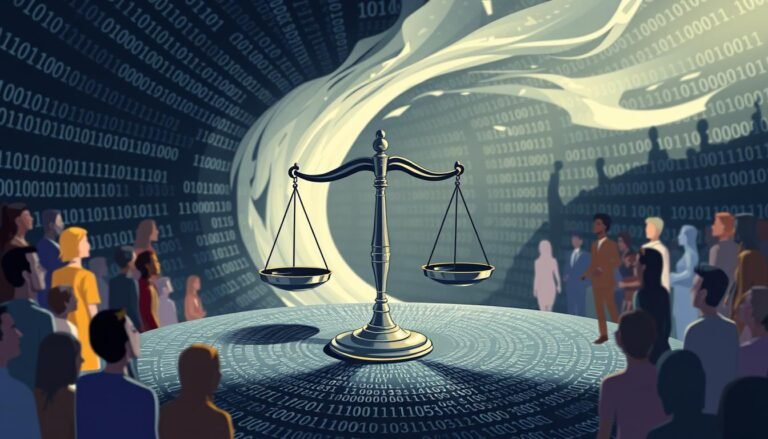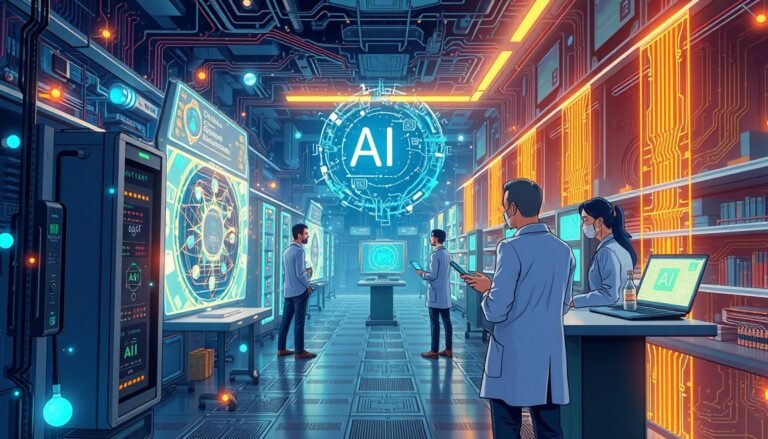AI in Space Exploration: Advancing Cosmic Frontiers
What if the key to unlocking the mysteries of the cosmos lies not in human hands, but in artificial intelligence? As we stand on the brink of a new era in space exploration, AI is emerging as the game-changer. It could propel us further into the unknown than ever before.
Space exploration has always been a frontier of human innovation. But the integration of AI is taking it to new heights. From Earth-based control rooms to the depths of space, AI is revolutionizing how we approach cosmic ventures.
It’s not just about sending robots to Mars anymore. It’s about creating intelligent systems that can make decisions in real-time. These systems can adapt to unexpected challenges and even design self-sustaining habitats for future space colonists.
As Earth’s resources dwindle, the need for extraterrestrial resource acquisition becomes more pressing. AI is at the forefront of this cosmic quest. It enables us to mine data from space missions with unprecedented efficiency.
This technology is not just enhancing our current missions. It’s paving the way for deep space exploration. This could one day lead us to encounter extraterrestrial intelligence.
Key Takeaways
- AI is crucial for overcoming communication delays in deep space missions
- Space data mining is enhanced by AI, improving resource discovery
- AI supports the design of self-sustaining space habitats
- Real-time decision making in space is now possible with AI systems
- AI is essential for adapting to unexpected challenges in cosmic exploration
The Evolution of AI in Cosmic Ventures
AI in space exploration has made huge strides. It began with Earth-based control systems and has evolved to include autonomous space systems. This change is a big leap in exploring the cosmos.
From Earth-based Control to Autonomous Systems
Space missions used to depend on Earth for control. Now, AI lets spacecraft make decisions on their own. This is crucial for deep space, where Earth’s signals are too slow.
Overcoming Communication Delays in Deep Space
Deep space signals take a long time to reach Earth. AI fixes this by letting spacecraft act quickly. This is vital for missions far from Earth.
AI’s Role in Real-time Decision Making
AI enables space systems to make smart choices instantly. It can spot and solve problems without human help. This makes space missions safer and more efficient.
| AI Capability | Benefit in Space Exploration |
|---|---|
| Autonomous decision-making | Quick responses in deep space |
| Real-time problem solving | Improved mission safety |
| Data analysis | Faster scientific discoveries |
As AI gets smarter, it will play an even bigger role in space exploration. Future missions will rely more on these smart systems. This will help us achieve more in space.
Astrobees: NASA’s Free-Flying Robotic Assistants
NASA’s Astrobees are changing space robotics on the International Space Station (ISS). These robots are leading the way in AI for space exploration. They help astronauts with everyday tasks, making their work easier.
The Astrobee system has three robots: Bumble, Honey, and Queen. Each is a cube, 12.5 inches on each side, moving in zero gravity with electric fans. They have cameras, sensors, and lights for tasks like monitoring, inventory, and videos.
Since 2018, Astrobees have worked thousands of hours in space. They’ve made history in space robotics:
- Completed an interior survey of a spacecraft
- Detected sound sources in space
- Navigated autonomously between ISS modules
NASA’s Game Changing Development Program supports the Astrobee project. The ISS Utilization Office also helps. These robots are a big step up from the SPHERES system, which was much smaller.
| Feature | Astrobee | SPHERES |
|---|---|---|
| Operating Area | Entire ISS | 2x2x2 cubic meters |
| Propulsion | Electric fans | CO2 thrusters |
| Power Source | Rechargeable batteries | AA batteries |
| Processor | Advanced multi-level processors | Standalone DSP |
Astrobees are leading the way in space robotics. They’re making space exploration better with their advanced technology.
AI-Powered Structural Design for Space Habitats
Space habitat design is changing fast with AI. Building habitats in space is tough, but AI is helping. It’s making space habitat design smarter and more efficient.
Topology Optimization in Non-Parametric Structural Design
Topology optimization is changing space design. It makes structures based on how well they work, not just their shape. This leads to designs that are both light and strong, perfect for space.
Finite Element Method (FEM) in Space Structure Simulation
FEM is key for simulating space structures. It breaks down big designs into smaller parts. This helps engineers test and improve designs before they’re built.
Autonomous Design Tools for Extraterrestrial Construction
AI tools are essential for building in space. They can make and use the best designs on their own, even when far from Earth. This is important because of the long delays in space communication.
| AI Application | Benefit for Space Habitats |
|---|---|
| Topology Optimization | Creates efficient, strong structures |
| FEM Simulation | Tests designs before construction |
| Autonomous Design Tools | Enables real-time optimization |
AI is making a big difference in space habitat design. It’s leading to better, more flexible, and durable structures for space travelers.
Space Robotics: Pioneers of Celestial Exploration
Space robotics is changing how we explore space. These robots can do jobs that are too risky or hard for humans. They help with maintenance and scientific experiments, making our space journey easier.
The Astrobee system, made by NASA, is a great example. These small robots, about the size of a shoebox, can move around in space. They use special fans to do so. They help astronauts by doing routine tasks, so they can focus on important research.
Astrobees have cool features. They have six cameras for better video and can spot dangers. They also have touch screens, microphones, and speakers for talking to astronauts. Plus, they can find a charging spot on their own, always ready to work.
The future of space travel depends on robots. As we plan to live on the moon and Mars, robots will be key. They’ll help build homes, check things out, and do experiments in tough places.
AI is making space robots smarter. It lets them make quick decisions, which is vital for long trips to other planets. This is important because we can’t always talk to Earth right away.
| Robot Type | Key Functions | Benefits |
|---|---|---|
| Astrobee | Routine tasks, research platform | Frees astronaut time, enhances ISS operations |
| Mars Rovers | Surface exploration, sample collection | Gathers crucial data about Mars |
| Robotic Arms | Spacecraft maintenance, payload handling | Reduces spacewalk risks, improves efficiency |
As we explore more space, robots and humans working together will be our biggest strength. Space robotics is not just about exploring. It’s about growing our knowledge and achievements.
AI in Space Exploration: Transforming Cosmic Missions
AI is changing space missions in big ways. It makes spacecraft smarter and helps sort through huge amounts of data. This opens up new possibilities in space.
Enhancing Spacecraft Autonomy
Autonomous space systems are key for deep space trips. AI lets spacecraft decide on their own, cutting down on Earth’s control. This is crucial for missions where delays can slow down decisions.
AI-driven Data Analysis from Space Missions
Space data mining is a big deal in space research. AI sorts through huge datasets, finding patterns and making new discoveries. This helps us learn more about space and its wonders.
Predictive Maintenance for Space Equipment
AI is changing how we keep space gear running. It looks at sensor data to predict when things might break. This helps keep space missions going longer and safer.
- Reduces unexpected equipment failures
- Optimizes maintenance schedules
- Extends mission durations
As AI in space keeps getting better, we’ll see even more amazing discoveries and missions. The future of space exploration looks bright.
Extraterrestrial Resource Acquisition and AI
Space mining is a key area where AI is making a big impact. As we explore space, finding resources is a top priority. AI helps by scanning the cosmos for valuable materials on asteroids, planets, and moons.
In space, where gravity is low, AI comes up with smart mining methods. These systems adjust to the unique challenges of space, making sure mining is safe and productive. The idea of mining space is exciting, with rare elements waiting to be found.
When it comes to mining in space, we must think about ethics. AI helps us do this by promoting sustainable practices. It makes sure we don’t harm the planets we study while getting the resources we need.
“AI transforms space mining from science fiction to reality, opening new frontiers for humanity’s resource needs.”
The future of space travel depends on using resources found in space. AI is leading the way, connecting our needs on Earth with the riches of the cosmos.
| AI Application | Benefit in Space Mining |
|---|---|
| Resource Detection | Identifies valuable deposits on celestial bodies |
| Mining Automation | Enables efficient extraction in harsh environments |
| Sustainability Analysis | Ensures responsible resource exploitation |
| Economic Forecasting | Predicts profitability of space mining ventures |
AI-Enhanced Space Weather Forecasting
Space weather forecasting is key to keeping satellites and space assets safe. AI has changed how we predict and handle solar storms and cosmic rays. It helps us understand space better and keeps space missions safer.
Protecting Satellites and Space Assets
AI systems look at lots of data to find threats to satellites and other space objects. These smart algorithms can spot space weather events more accurately. This lets operators prepare ahead of time. Thanks to AI, space objects are much safer now.
Improving Solar Storm Predictions
Solar storms are a big threat to space and Earth’s tech. AI uses data from solar observatories to predict these storms very well. This helps keep power grids and communication systems safe on Earth.
AI Models for Cosmic Ray Detection
Cosmic rays are a danger to astronauts and space electronics. AI can find and track these particles better than old methods. This helps protect space travelers and their gear.
| AI Application | Benefit | Impact |
|---|---|---|
| Satellite Protection | Early warning system | Reduced damage to space assets |
| Solar Storm Prediction | Improved accuracy | Enhanced protection of Earth’s infrastructure |
| Cosmic Ray Detection | Better tracking | Increased safety for astronauts and equipment |
Autonomous Space Systems for Deep Space Exploration
Autonomous space systems are changing how we explore deep space. These AI-powered machines can work alone for a long time. They make important decisions without needing humans. As we explore more of the universe, we need spacecraft that can rely on themselves.
AI in space exploration has big challenges. The extreme conditions of deep space require strong systems. These systems must adapt to surprises. Engineers are working on AI that can handle extreme temperatures, radiation, and long isolation.
The future of space missions looks bright with autonomous systems. They could be crucial for traveling between stars and finding life beyond Earth. These AI explorers might be the first to meet alien life.
“Autonomous space systems are the pioneers of our cosmic future. They’ll go where humans can’t, see what we can’t see, and discover what we can’t imagine.”
Here are some key benefits of autonomous systems in deep space exploration:
- Reduced communication delays
- Improved decision-making in real-time
- Extended mission durations
- Increased data collection and analysis capabilities
As AI gets better, we’ll see more advanced autonomous space systems. These pioneers will help us understand more about the universe. They will lead us to new discoveries in space.
AI in Space Debris Tracking and Mitigation
Tracking space debris is now a big challenge in space exploration. The cosmos is getting crowded with old satellites and rocket parts. AI is helping to clean up this mess, making space safer for future missions.
Machine Learning for Orbital Debris Detection
AI is changing how we find space objects. It can spot small pieces that old methods miss. By looking at lots of data from sensors on Earth and in space, AI gives us a better view of what’s up there.
AI-powered Collision Avoidance Systems
Satellites now use AI to avoid space junk. These systems predict dangers and change orbits to avoid them. This is important because even a small piece of debris can cause big problems at high speeds.
Developing Strategies for Space Junk Removal
AI is also helping plan how to clean up space. It designs robots to pick up debris and burn it up in Earth’s atmosphere. These AI-led efforts are essential for keeping space safe for exploration and satellite use. As we explore more, AI will be our partner in managing space debris.
Source Links
- Optimizing Additive Manufacturable Structures with Computer Vision to Enhance Material Efficiency and Structural Stability
- Astrobees: Revolutionizing Space Exploration
- Ocean iron fertilization revived to capture billions of tons of CO2
- Early dark energy could resolve cosmology’s two biggest puzzles
- Why This Startup Wants to Bury Nuclear Reactors a Mile Underground
- Small Steps, Giant Leaps: Episode 133: The Science of Space Gardening – NASA
- NASA invites industry input on Astrobee space robotics
- NASA Astrobee Robotic Free Flyer Powered by 6501 Micro (SOM)
- Synergistic Impacts of Climate Change and Wildfires on Agricultural Sustainability—A Greek Case Study
- Comparative Stem Transcriptome Analysis Reveals Pathways Associated with Drought Tolerance in Maritime Pine Grafts
- Chain Fusion Hub @ Token2049 by ICP Attracts The Leading Ethereum, Bitcoin & Cosmos Ecosystems
- Pixel 10 Series to Feature 3nm Tensor G5 Manufactured by TSMC – PUNE.NEWS
- Article | Saturn Astrology: Unveiling Resilience, Justice, and Destiny in Vedic Charts
- Web3 Innovation and Transformation: InnoBlock 2024 Held by ABGA and BBS
- Gone Rogue – all the roguelike games that launched last week (September 7 – 13) – Rogueliker
- Harris is promoting her resume and her goals rather than race as she courts Black voters
- A look at Harvey Weinstein’s health and legal issues as he faces more criminal charges
- Ballerina Michaela DePrince, whose career inspired many after she was born into war, dies at 29
- Why ORNG’s founder pivoted from college food ordering to real-time money transfer | TechCrunch
- Top 8 Open-Source LLMs for 2024 and Their Uses
- New fossil fish species scales up evidence of Earth’s evolutionary march – Scientific Inquirer
- Cultivating Trust in AI for Disaster Management – Eos
- DAILY DOSE: First Commercial Spacewalk Achieved by Polaris Dawn; OpenAI Unveils o1 Model with Enhanced Reasoning. – Scientific Inquirer
- The 2024 Global Methane Budget reveals alarming trends







